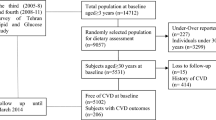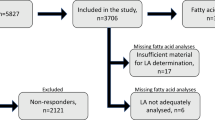Abstract
Objectives: To determine antioxidant levels in plasma, low density lipoprotein (LDL) and high density lipoprotein (HDL) before and after supplementation with a carotene mixture or lycopene; to examine the interrelationships between carotenoids and tocopherols in plasma, LDL and HDL under normal dietary conditions and after supplementation with carotene or lycopene; and to investigate whether supplementation with a carotene mixture or lycopene could enhance the ability of LDL to withstand oxidative stress in vitro, in a group of healthy elderly people aged ≥65 y.
Design: Randomized placebo controlled double blind study.
Setting: Free living urban adults in Ireland.
Subjects: Fifty-one volunteers aged ≥65 y.
Interventions: Volunteers were each provided with capsules providing either 13.3 mg lycopene, or 11.9 mg carotene or placebo for 12 weeks.
Results: Both absolute and cholesterol standardized plasma carotenoid concentrations correlated strongly with LDL and HDL concentrations of carotenoids before and after supplementation with carotene or lycopene. Supplementation with a carotene mixture or lycopene had no effect on oxidative modification of LDL in vitro despite significant increases in plasma and LDL concentrations of lycopene, α-carotene and β-carotene.
Conclusions: The results of this study suggest that, in unsupplemented individuals, plasma can act as a biomarker of carotenoid and γ-tocopherol concentrations in both LDL and HDL. Supplementation with carotenes or lycopene do not reduce or delay oxidation of LDL. These results support the assumption that carotenoids, such as β-carotene and lycopene, may show protective effects because they are good markers of fruit and vegetable intake.
Sponsorship: Commission of the European Communities: AAIR Project (AIR2-CT93-0888).
European Journal of Clinical Nutrition (2000) 54, 500–507
This is a preview of subscription content, access via your institution
Access options
Subscribe to this journal
Receive 12 print issues and online access
$259.00 per year
only $21.58 per issue
Buy this article
- Purchase on Springer Link
- Instant access to full article PDF
Prices may be subject to local taxes which are calculated during checkout
Similar content being viewed by others
Author information
Authors and Affiliations
Contributions
Guarantor: BMC.
Contributors: YLC is a research fellow and was the principal investigator and author. BMC (research fellow and developed the research project. PAM also developed the research project).
Corresponding author
Rights and permissions
About this article
Cite this article
Carroll, Y., Corridan, B. & Morrissey, P. Lipoprotein carotenoid profiles and the susceptibility of low density lipoprotein to oxidative modification in healthy elderly volunteers. Eur J Clin Nutr 54, 500–507 (2000). https://doi.org/10.1038/sj.ejcn.1601046
Received:
Revised:
Accepted:
Published:
Issue Date:
DOI: https://doi.org/10.1038/sj.ejcn.1601046
Keywords
This article is cited by
-
Disease Prevention and Treatment Using β-Carotene: the Ultimate Provitamin A
Revista Brasileira de Farmacognosia (2022)
-
Effect of lycopene on the copper-induced oxidation of low-density lipoprotein in broiler chickens
SpringerPlus (2016)
-
Lycopene from two food sources does not affect antioxidant or cholesterol status of middle-aged adults
Nutrition Journal (2004)
-
Effects of enhanced consumption of fruit and vegetables on plasma antioxidant status and oxidative resistance of LDL in smokers supplemented with fish oil
European Journal of Clinical Nutrition (2003)



